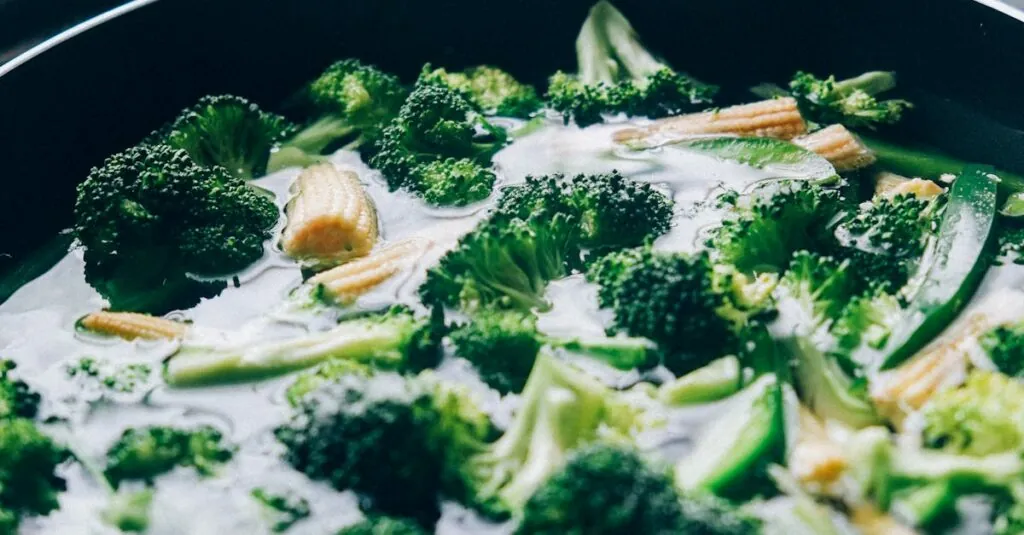Table of Contents
ToggleBaby broccoli, or as some like to call it, the adorable little cousin of regular broccoli, packs a powerful nutritional punch that’s hard to ignore. This tiny green powerhouse is not just cute; it’s a nutrient-dense superfood that can elevate any meal. If you think veggies are boring, think again! Baby broccoli is here to prove that healthy eating can be both fun and delicious.
Overview of Baby Broccoli Nutrition
Baby broccoli packs a nutritional punch, making it a valuable addition to any diet. Rich in vitamins and minerals, this vegetable contains significant amounts of vitamin C, vitamin K, and folate. These nutrients support immune health and promote strong bones.
Fiber content in baby broccoli aids digestion, enhancing overall gut health. A single serving typically provides 3 grams of dietary fiber, supporting daily intake recommendations. Antioxidant properties also play a crucial role in reducing inflammation and combating oxidative stress.
Minerals such as calcium and potassium contribute to muscle function and cardiovascular health. Calcium aids in maintaining strong bones, while potassium helps regulate blood pressure. Consuming baby broccoli can help fulfill daily mineral needs effectively.
For those focused on weight management, baby broccoli is an excellent choice due to its low calorie content. One cup of cooked baby broccoli contains approximately 55 calories, allowing for satisfying meals without excessive calorie intake.
Furthermore, the high water content makes it a hydrating option. Nutrient density combined with low calories promotes a balanced diet without compromising taste. Including baby broccoli in meals provides a delicious way to increase essential nutrient intake.
Incorporating baby broccoli in various dishes showcases its versatility. It pairs well with stir-fries, salads, and soups, enhancing flavors while adding health benefits. Increasing intake of this superfood can lead to improved overall health and well-being.
Nutritional Profile
Baby broccoli stands out as a nutrient powerhouse, offering a range of essential vitamins and minerals that support overall health.
Vitamins and Minerals
Rich in vitamin C, baby broccoli boosts the immune system and promotes healthy skin. Vitamin K plays a crucial role in bone health and blood clotting. Folate, another key nutrient, supports cell division and is particularly important during pregnancy. In addition, baby broccoli contains vital minerals such as calcium, which aids in bone strength and potassium, essential for muscle function and heart health. Each cup packs a nutritious punch while contributing only about 55 calories.
Fiber Content
High dietary fiber content allows baby broccoli to support digestive health effectively. Fiber promotes regular bowel movements, helping to prevent constipation. Including fiber in the diet can also enhance feelings of fullness, which can assist in weight management. Notably, the fiber in baby broccoli can help regulate blood sugar levels, contributing to overall metabolic health. With each serving, it provides essential nutrients while ensuring a satisfying addition to a balanced diet.
Health Benefits of Baby Broccoli
Baby broccoli offers numerous health benefits that contribute to overall well-being. Its nutrient profile supports various bodily functions, making it a valuable addition to any diet.
Antioxidant Properties
Antioxidants in baby broccoli help neutralize free radicals. These compounds reduce oxidative stress and lower the risk of chronic diseases. Vitamin C, in particular, acts as a powerful antioxidant, supporting skin health and immune function. Furthermore, sulforaphane, found in baby broccoli, possesses anti-inflammatory properties, which may protect against certain cancers. Research indicates that a diet rich in antioxidants can enhance longevity and improve quality of life.
Dietary Fiber and Digestion
Dietary fiber in baby broccoli aids digestion effectively. Consuming fiber promotes regular bowel movements, preventing constipation. This vegetable contains both soluble and insoluble fibers, which contribute to gut health. By enhancing feelings of fullness, fiber also assists in weight management and blood sugar regulation. Studies show that sufficient fiber intake may reduce the risk of developing gastrointestinal diseases. Incorporating baby broccoli into meals encourages a balanced diet and supports a healthy digestive system.
Culinary Uses of Baby Broccoli
Baby broccoli is versatile in the kitchen, enhancing a range of dishes while preserving its nutritional benefits. This vegetable adapts well to various cooking methods.
Cooking Methods
Steaming baby broccoli preserves its vibrant color and nutrients while ensuring a crisp texture. Sautéing brings out its natural sweetness and offers a quick cooking option. Roasting elevates its flavor profile, creating caramelized edges and a tender interior. Simply blanching in boiling water for a brief period maintains its bright color and crunchiness. Incorporating baby broccoli into stir-fries allows for quick preparation alongside other ingredients.
Pairing with Other Ingredients
Baby broccoli pairs well with garlic, lemon, and olive oil, enhancing its flavor profile. Incorporating nuts, such as almonds or pine nuts, adds a satisfying crunch and differentiates dishes. Cheese varieties, like Parmesan or feta, provide a creamy contrast to the vegetable’s texture. Combining baby broccoli with grains, such as quinoa or brown rice, creates a well-rounded meal filled with nutrients. Additionally, it complements proteins like chicken or tofu, making it a perfect addition to balanced dishes.
Tips for Selecting and Storing Baby Broccoli
Selecting baby broccoli requires attention to freshness and quality. Look for vibrant green stems and tightly closed florets. Inspect for any signs of yellowing or wilting, which indicate age. Stems should feel firm and sturdy, ensuring better taste and texture.
Storage plays a crucial role in maintaining baby broccoli’s nutritional value. Store in the refrigerator in a breathable bag. Keep it in the crisper drawer to preserve moisture. Avoid washing before storage to prevent spoilage, and wash just before use.
Using baby broccoli within a few days of purchase maximizes its freshness. Cooking methods affect nutritional retention, so consider lightly steaming or sautéing. Use minimal water to prevent leaching of nutrients.
Freezing baby broccoli is an option for longer-term storage. Blanch it briefly in boiling water before freezing to preserve color and nutrients. Package in airtight containers to prevent freezer burn and ensure quality when thawed.
Lastly, consider buying organic baby broccoli when possible. Organic options may contain fewer pesticides and fertilizers, benefiting overall health. Supporting local farmers at farmer’s markets can also provide fresher selections.
Baby broccoli stands out as a powerhouse of nutrition that can easily fit into a variety of meals. Its impressive vitamin and mineral content supports overall health while its versatility in the kitchen makes it a delightful addition to any dish. By incorporating baby broccoli into daily meals, individuals can enhance their diet with essential nutrients and antioxidants that promote well-being. With proper selection and storage techniques, enjoying this superfood can be both simple and rewarding. Embracing baby broccoli not only boosts health but also adds a flavorful touch to culinary creations.







